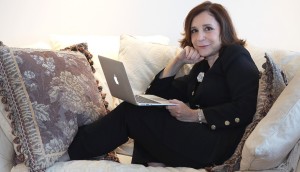
Sherry Turkle, a professor at MIT and a psychologist by training researches the relationship between humans and technology. Her recent writing has focused on how new forms of communication – email, texting, and social media – are affecting our lives. In her latest book, Reclaiming Conversation: The Power of Talk in A Digital Age, her message is clear: Stop Googling, Let’s Talk. And yet the tech critic is, by no means, a Luddite. Prof. Turkle talks to Beta Boston about her digital habits. Yes, she has an iPhone.
Do you sleep with your iPhone?
I am a no-tech person to wake up: In the summer, I am so lucky to have a house at the cape. I wake up with the sun on the water, and the sound of the waves. In the winter, I am blessed with a home that brings me the sunrise.
What is an app you love?
The one that I obstinately continue to call “books on tape” but they’re not—they are books downloaded to my iPhone that I read as I walk and drive and exercise. I love to be read to. I remember one embarrassing winter morning, sitting in my car an MIT parking lot, in the freezing cold, finishing a chapter of Suite Française on tape!
I could have, of course, gotten out of the car and walked into the MIT building, but with headphones on, concentrating on my book, I would have ignored everyone around. That would be antithetical to my message—not to use technology to wall you off from what is around you, so I stayed in my car engrossed, waiting for the chapter to end. And then, I was ready to go to work.
What is the last book you read on your iPhone?
The neurologist Dr. Oliver Sacks’ final memoir: On the Move. He passed away in August. He was one of my heroes.
Do you have a tech guilty pleasure?
I sometimes download junk novels on my iPhone. I quickly power through these good bad books, zipping through them without reading every word.
Are you an inbox-zero kind of person?
No. I am not an inbox zero type at all. Right now, I have 1062 unopened emails in my box. Last week, The New York Times published the Sunday Review essay adapted from my new book, so there reader responses to the article. And a lot of readers wrote me directly! And there are congratulatory emails, some from friends who went to elementary school with me.
Usually, I keep the numbers of unopened emails down to a couple of 100.
Do people who go out to dinner/coffee with you know better than to put their phones on the table?
That raises a sensitive point. I don’t want to be the telephone police so I never say anything if people leave their phones on the table, but increasingly, as my friends realize what I’m working on these days, they tend to put their phones away.
What is a “can’t do without” technology?
My iCal that synchronizes my calendar with that of my assistant. Having this happen automatically brings order where there was disorder: the magic of not double-booking dissertation defenses and trips to the dentist! It has been a long time but it still seems like magic! I think that is how you measure a generation. When something like that still seems like magic to someone like me who should by now be totally used to it. I’ll never take it for granted. Magic!
What is one object of technology you feel very closely connected to?
I am a writer and love writing in my MacBook Air. I don’t write at a desk. I sit on my couch with this laptop on my knees. In high school, I learned to compose at a keyboard and the Air gives me the keyboard feeling I grew up with (tablets don’t do this yet) but I have the smallest Air so I can throw it in my purse and have it with me all the time. I don’t carry a briefcase. If a handbag isn’t large enough for the Air, I probably don’t buy it. I take notes on it, plan my courses on it, write my books on it. Now, I’m sketching out the chapters for a memoir. Writing on it feels very intimate, perhaps because of its size, perhaps because it is with me all the time. When people talk to me about feeling their smartphones are an extension of themselves, I think of my connection to my MacBook Air.
And what’s a technology you don’t want to have?
A robot that comes on as a best friend is putting itself in an “as-if” situation. It doesn’t understand loss or love or grief or anxiety. It knows how to model these things and models a response to you that play acts at empathy. And we are “cheap dates” it seems, ready to accept this “as if” empathy for the real thing. We turn conversation into mere connection. In doing so, I fear we may start to forget the difference.
There is no reason, to my way of thinking, to put ourselves in these “as if” scenarios. We have everything we need for the kind that builds real empathy: We have each other.
Read here. html.